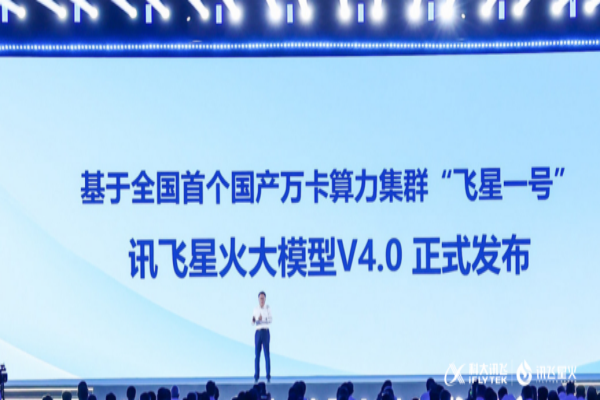
- Home
- Media Center
-
Events
- Wuzhen Summit
- Regional Forums
- Practice Cases of Jointly Building a Community with a Shared Future in Cyberspace
- World Internet Conference Awards for Pioneering Science and Technology
- The Light of Internet Expo
- Straight to Wuzhen Competition
- Global Youth Leadership Program
- WIC Distinguished Contribution Award
- Membership
- Research & Cooperation
- Digital Academy
-
Reports
- Collection of cases on Jointly Building a Community with a Shared Future in Cyberspace
- Collection of Shortlisted Achievements of World Internet Conference Awards for Pioneering Science and Technology
- Reports on Artificial Intelligence
- Reports on Cross — Border Ecommerce
- Reports on Data
- Outcomes of Think Tank Cooperation Program
- Series on Sovereignty in Cyberspace Theory and Practice
- Other Achievements
- About WIC
- 中文 | EN

iFlytek unveils upgraded LLM that 'outperforms GPT-4 Turbo'

iFlytek chairman Liu Qingfeng unveils latest version of its large language model, Spark-Desk V4.0. [Photo provided to chinadaily.com.cn]
Chinese artificial intelligence pioneer iFlytek officially launched the latest version of its large language model, Spark-Desk V4.0, which its chairman Liu Qingfeng said showcased significant advancements in core capabilities.
Liu highlighted that the latest Spark-Desk V4.0 not only ranks first in eight major international benchmarks, surpassing domestic models, but also outperforms GPT-4 Turbo in areas such as text generation, language comprehension, knowledge Q&A, logical reasoning and mathematical abilities.
Liu emphasized the breakthroughs achieved by the Spark-Desk V4.0 in the era of the Internet of Things. The model now supports seamless conversation across 74 languages and dialects, tackling the challenge of speech recognition in highly noisy environments. Additionally, the model introduces advanced speech-to-text technology for complex scenarios, earning multiple international AI awards.
A key highlight of the event was the introduction of the Spark intelligent grading machine. Leveraging the powerful foundation of the Spark-Desk V4.0, this device intelligently grades assignments across various subjects and question types, instantly generating detailed multi-dimensional performance reports. This enables teachers to provide differentiated guidance during reviews.
Liu Cong, head of iFlytek's research institute, demonstrated the grading machine's capabilities, showing how it can identify and mark assignments as efficiently as a teacher. What previously took 90 minutes to grade can now be done in five minutes, and analyzing performance data, which used to take 60 minutes, now only requires one minute. With the help of personalized assignments, students' error resolution rates have improved from 50 percent to 73 percent.
iFlytek said the Spark developer ecosystem has rapidly grown in just five months. The number of third-party developers working around its Spark-Desk increased from 5.98 million to 7.02 million. Among them, overseas developers exceeded 400,000.
Recently, the US company OpenAI said it is planning to block access to technology used to build AI products for entities in China and some other countries, which has triggered heated discussions in among Chinese netizens, with some saying that "OpenAI turns into CloseAI".
In response, Liu said, only a prosperous, independent ecosystem can ensure a bright future for China's artificial intelligence industry. He stressed the importance of scientifically and rationally understanding the overall gap between China and the United States in large models while having the confidence in catching up quickly.

The World Internet Conference (WIC) was established as an international organization on July 12, 2022, headquartered in Beijing, China. It was jointly initiated by Global System for Mobile Communication Association (GSMA), National Computer Network Emergency Response Technical Team/Coordination Center of China (CNCERT), China Internet Network Information Center (CNNIC), Alibaba Group, Tencent, and Zhijiang Lab.





